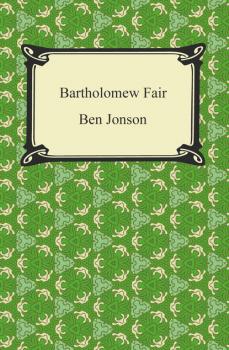Ben Jonson
Список книг автора Ben JonsonEvery Man out of His Humour
"Every Man out of His Humour" by Ben Jonson. Published by Good Press. Good Press publishes a wide range of titles that encompasses every genre. From well-known classics & literary fiction and non-fiction to forgotten−or yet undiscovered gems−of world literature, we issue the books that need to be read. Each Good Press edition has been meticulously edited and formatted to boost readability for all e-readers and devices. Our goal is to produce eBooks that are user-friendly and accessible to everyone in a high-quality digital format.
The Alchemist
"The Alchemist" by Ben Jonson. Published by Good Press. Good Press publishes a wide range of titles that encompasses every genre. From well-known classics & literary fiction and non-fiction to forgotten−or yet undiscovered gems−of world literature, we issue the books that need to be read. Each Good Press edition has been meticulously edited and formatted to boost readability for all e-readers and devices. Our goal is to produce eBooks that are user-friendly and accessible to everyone in a high-quality digital format.
The Alchemist
Benjamin Jonson (1572-1637) was a Renaissance dramatist, poet and actor, known best for his satirical plays and lyric poems. He had a knack for absurdity and hypocrisy, a trait that made him immensely popular in the 17th century Renaissance period. However, his reputation diminished somewhat in the Romantic era, when he began to be unfairly compared to Shakespeare. The Theatre in London had had been denied to «The Admiral's Men» in 1597, but the troupe regained control of it sometime between 1608 and 1610 and «The Alchemist» was among the first plays chosen to be performed there. The comedy transported a classical drama into contemporary London, resulting in a fully modernized depiction of human folly, vice and foolishness. The Alchemist is generally considered one of Jonson's most vivid and characteristic works, and was recognized by Samuel Taylor Coleridge as one of the three most perfect plots in literature. It remains one of Jonson's most revived plays.
Bartholomew Fair
Ben Jonson's career began in 1597 when he held a fixed engagement in the «Admiral's Men», and although he was unsuccessful as an actor, his literary talent was apparent and he began writing original plays for the troupe. It is known that Shakespeare's company produced several of Jonson's plays, Shakespeare himself appearing in at least one, («Every Man in His Humour»). «Bartholomew Fair» was written in 1614, during the time considered to be Jonson's heyday (1605-1620), and is one of the playwright's most popular works. The story takes place on St. Bartholomew's day, where in the town of Smithfield an annual fair was held. To Jonson, the fair was a representation of society. In addition to the chaotic fair itself, characters like the justice-seeking Adam Overdo; Bartholomew Cokes, a confident but witless man of means; and the hypocritical Puritan, Zeal-of-the-Land Busy, reflected the madness that the playwright saw in the world.
Cynthia's Revels, or, The Fountain of Self-Love
Benjamin Jonson (1572-1637) was a Renaissance dramatist, poet and actor, known best for his satirical plays and lyric poems. Jonson had a knack for absurdity and hypocrisy, a trait that made him immensely popular in the 17th century Renaissance period. However, his reputation diminished somewhat in the Romantic era, when he began to be unfairly compared to Shakespeare. Although Jonson attained a long and thriving career, the majority of his major works for which he is revered were produced between 1605 and 1620. Just prior to this heyday, in 1601 the playwright produced «Cynthia's Revels, or The Fountain of Self-Love,» a sort of stepping stone towards his subsequent masterpieces. The play was part of the so-called Poetomachia, or War of the Theatres, between Jonson and playwrights John Marston and Thomas Dekker. The character Cynthia represented Queen Elizabeth, and the play was marked by violence and controversy in reflection of the queen's final reigning years.
Every Man in His Humour
Ben Jonson's career began in 1597 when he held a fixed engagement in the «Admiral's Men», and although he was unsuccessful as an actor, his literary talent was apparent and he began writing original plays for the troupe. Jonson had a knack for absurdity and hypocrisy, a trait that made him immensely popular in the 17th century Renaissance period. It is known that Shakespeare's company produced several of Jonson's plays, Shakespeare himself appearing in «Every Man in His Humour» (1598). The play was Jonson's first major success, written in the style of «humour plays», a genre of comedy originated by George Chapman. In it, Jonson targets some of his favorite topics for satire: education, love, poetry, and social classes. As each major character represents a different issue, the play transforms into a depiction of everyday Renaissance life, and a scathing social commentary on the problems that plagued it.
Every Man Out of His Humour
Benjamin Jonson (1572-1637) was a Renaissance dramatist, poet and actor, known best for his satirical plays and lyric poems. He worked shortly as an actor in «The Admiral's Men», but soon moved on to writing original plays for the troupe. Jonson's works are highly significant to the English Renaissance, and are particularly recognizable because of his consistencies in style, intricacy of plot, characterization and setting. He focused on creating works that implemented elements of the realistic as well as the absurd. «Every Man Out of His Humour» is the companion play to the highly successful «Every Man in His Humour,» which was produced by and starred William Shakespeare. This comedy of humors, much like its prequel, is a satire of English society. Jonson's complex and witty characters are a scathing representation of the flaws he saw in education, love, poetry, and social classes around him.
A Tale of the Tub
Benjamin Jonson (1572-1637) was a Renaissance dramatist, poet and actor, known best for his satirical plays and lyric poems. His career began in 1597 when he held a fixed engagement in the «Admiral's Men», and although he was unsuccessful as an actor, his literary talent was apparent and he began writing original plays for the troupe. Jonson had a knack for absurdity and hypocrisy, a trait that made him immensely popular in the 17th century Renaissance period. However, his reputation diminished somewhat in the Romantic era, when he began to be unfairly compared to Shakespeare. «A Tale of a Tub» was the last of Jonson's plays to be staged during his lifetime. It is set on Valentine's Day, when the young Audrey Turfe is being chased by four different suitors. Audrey's father, the constable, is drawn into the disorder that ensues as each suitor attempts to sabotage the others' chances.
Eastward Ho
Benjamin Jonson (1572-1637) was a Renaissance dramatist, poet and actor, known best for his satirical plays and lyric poems. Jonson's works are particularly recognizable because of his consistencies in style, intricacy of plot, characterization and setting. He focused on creating works that implemented elements of the realistic as well as the absurd. For a few years around the turn of the century, Jonson had participated in the War of the Theatres with his rival playwrights, John Marston and Thomas Dekker; the men satirized each other in scathing comedies. However, a few years later Jonson worked with Marston and George Chapman on a satirical city comedy called «Eastward Ho!» The collaborative effort was a remarkable success, blending three very different writings styles into a single, coherent play. The tale of contemporary London life was written in response to the immense success of Thomas Dekker and John Webster's «Westward Ho!»
The Devil is an Ass
Benjamin Jonson's career began in 1597 when he held a fixed engagement in «The Admiral's Men», and although he was unsuccessful as an actor, his literary talent was apparent and he began writing original plays for the troupe. Jonson had a literary knack for absurdity and hypocrisy, a trait that made him immensely popular in the 17th century Renaissance period. His works are particularly recognizable because of his consistencies in style, intricacy of plot, characterization and setting. «The Devil is an Ass» is a mildly satirical play, in which a lesser devil named Pug is allowed by Satan to travel to London and entrap innocent souls. He is surprised, however, when his victims turn out to be more cunning and unscrupulous than expected. Subplots involving scams and deception weave together in this highly comical tale of a group of Londoners making an ass of the Devil.









